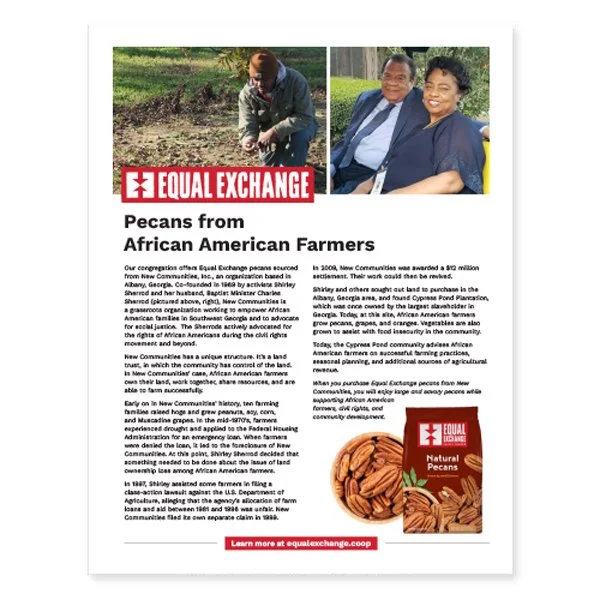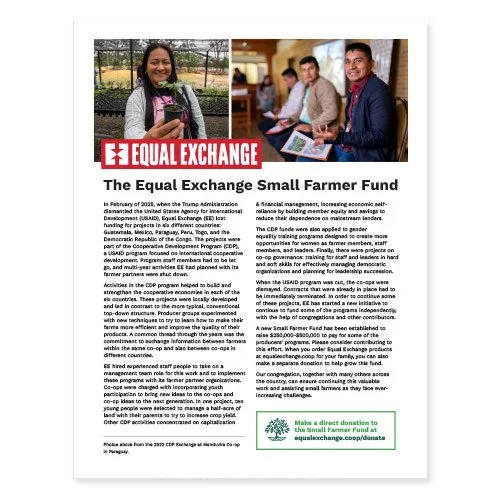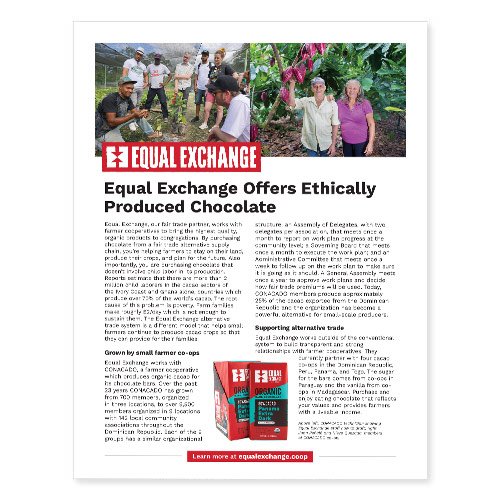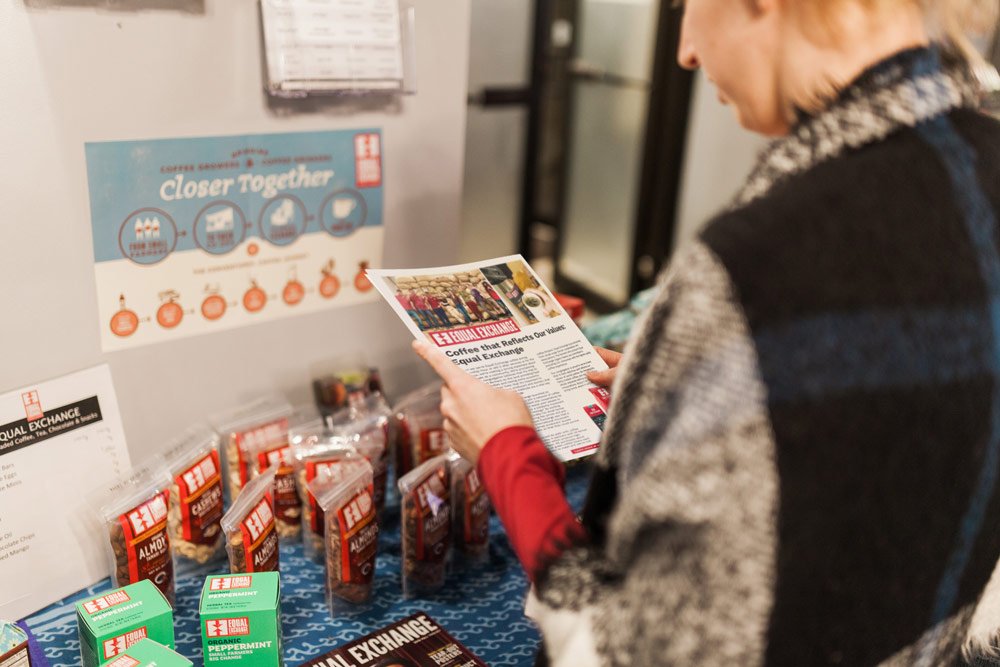
Church Bulletins
Include these prewritten pieces in your next church bulletin to spread the word about fair trade and Equal Exchange small farmer grown goods. Each bulletin comes in two formats. Printable 8.5x11 PDFs ready to download and use as is. Text and images to copy and paste if you're looking to excerpt a few lines or a paragraph for use in your bulletin or newsletter. Equal Exchange doesn't need to be credited. We’ll add more topics throughout the year, so check back often.
Church Bulletin #7
Pecans from African American Farmers
Our congregation offers Equal Exchange pecans sourced from New Communities, Inc., an organization based in Albany, Georgia. Co-founded in 1969 by activists Shirley Sherrod and her husband, Baptist Minister Charles Sherrod (pictured above, right), New Communities is a grassroots organization working to empower African American families in Southwest Georgia and to advocate for social justice. The Sherrods actively advocated for the rights of African Americans during the civil rights movement and beyond.
New Communities has a unique structure. It’s a land trust, in which the community has control of the land. In New Communities’ case, African American farmers own their land, work together, share resources, and are able to farm successfully.
Early on in New Communities’ history, ten farming families raised hogs and grew peanuts, soy, corn, and Muscadine grapes. In the mid-1970s, farmers experienced drought and applied to the Federal Housing Administration for an emergency loan. When farmers were denied the loan, it led to the foreclosure of New Communities. At this point, Shirley Sherrod decided that something needed to be done about the issue of land ownership loss among African American farmers.
In 1997, Shirley assisted some farmers in filing a class-action lawsuit against the U.S. Department of Agriculture, alleging that the agency’s allocation of farm loans and aid between 1981 and 1996 was unfair. New Communities filed its own separate claim in 1999. In 2009, New Communities was awarded a $12 million settlement. Their work could then be revived.
Shirley and others sought out land to purchase in the Albany, Georgia area, and found Cypress Pond Plantation, which was once owned by the largest slaveholder in Georgia. Today, at this site, African American farmers grow pecans, grapes, and oranges. Vegetables are also grown to assist with food insecurity in the community.
Today, the Cypress Pond community advises African American farmers on successful farming practices, seasonal planning, and additional sources of agricultural revenue.
When you purchase Equal Exchange pecans from New Communities, you will enjoy large and savory pecans while supporting African American farmers, civil rights, and community development.
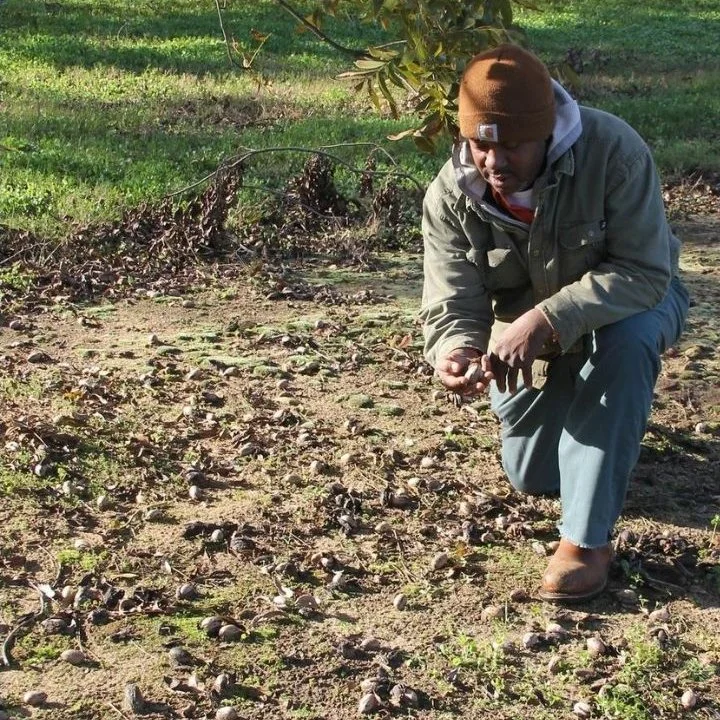
Harvesting pecans at Cypress Pond in Albany, Georgia.

Civil rights activists Shirley Sherrod and her husband, Baptist Minister Charles Sherrod, who founded New Communities in 1969.
Church Bulletin #6
The Equal Exchange Small Farmer Fund
In February of 2025, when the Trump Administration dismantled the United States Agency for International Development (USAID), Equal Exchange (EE) lost funding for projects in six different countries: Guatemala, Mexico, Paraguay, Peru, Togo, and the Democratic Republic of the Congo. The projects were part of the Cooperative Development Program (CDP), a USAID program focused on international cooperative development. Program staff members had to be let go, and multi-year activities EE had planned with its farmer partners were shut down.
Activities in the CDP program helped to build and strengthen the cooperative economies in each of the six countries. These projects were locally developed and led in contrast to the more typical, conventional top-down structure. Producer groups experimented with new techniques to try to learn how to make their farms more efficient and improve the quality of their products. A common thread through the years was the commitment to exchange information between farmers within the same co-op and also between co-ops in different countries.
EE hired experienced staff people to take on a management team role for this work and to implement these programs with its farmer partner organizations. Co-ops were charged with incorporating youth participation to bring new ideas to the co-ops and co-op ideas to the next generation. In one project, ten young people were selected to manage a half-acre of land with their parents to try to increase crop yield. Other CDP activities concentrated on capitalization & financial management, increasing economic self-reliance by building member equity and savings to reduce their dependence on mainstream lenders.
The CDP funds were also applied to gender equality training programs designed to create more opportunities for women as farmer members, staff members, and leaders. Finally, there were projects on co-op governance: training for staff and leaders in hard and soft skills for effectively managing democratic organizations and planning for leadership succession.
When the USAID program was cut, the co-ops were dismayed. Contracts that were already in place had to be immediately terminated. In order to continue some of these projects, EE has started a new initiative to continue to fund some of the programs independently, with the help of congregations and other contributors.
A new Small Farmer Fund has been established to raise $250,000-$500,000 to pay for some of the producers’ programs. Please consider contributing to this effort. When you order Equal Exchange products at equalexchange.coop for your family, you can also make a separate donation to help grow this fund.
Our congregation, together with many others across the country, can ensure continuing this valuable work and assisting small farmers as they face ever-increasing challenges.
Make a direct donation to the Small Farmer Fund at:
equalexchange.coop/donate
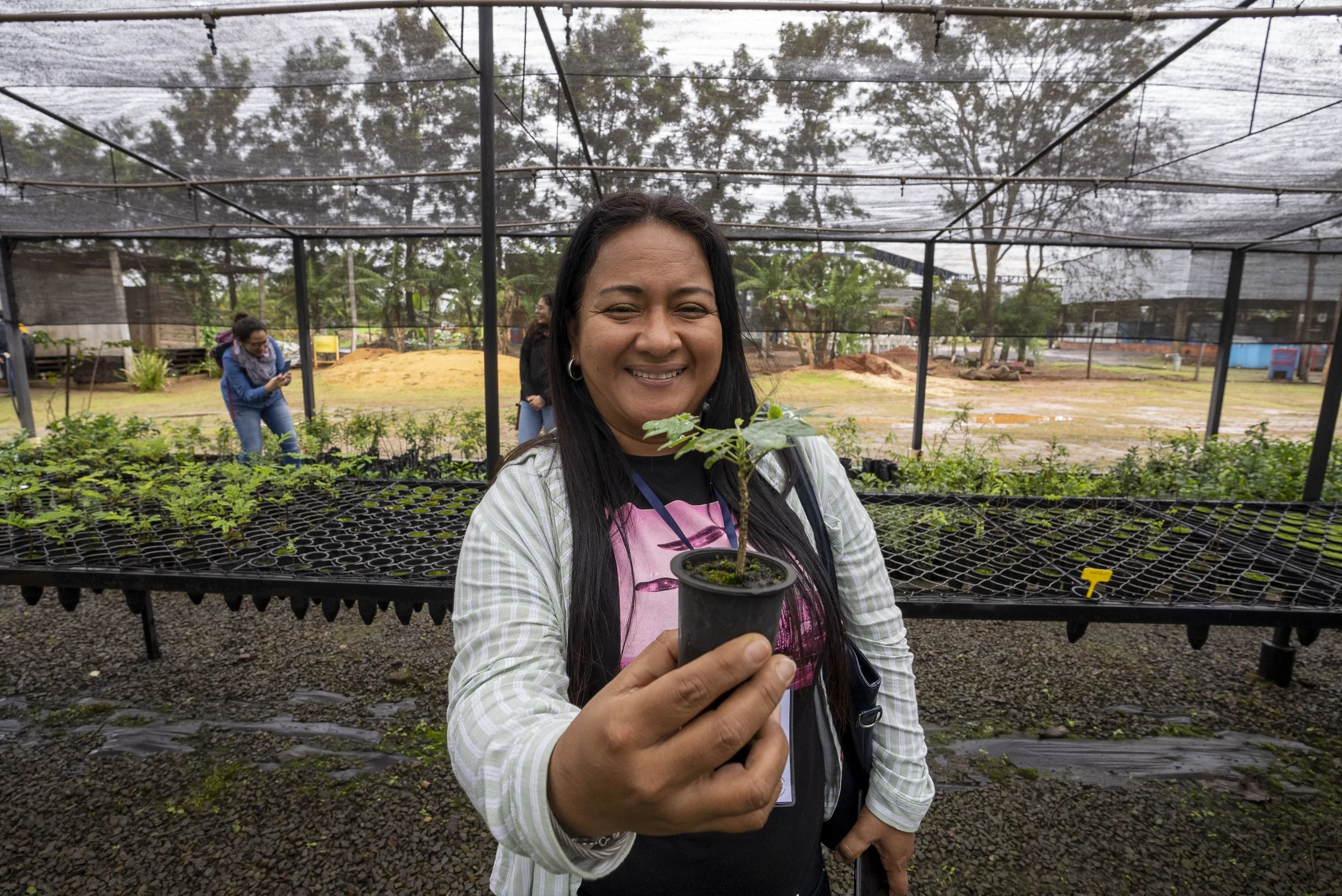
From the 2022 CDP Exchange at Manduvira Co-op in Paraguay
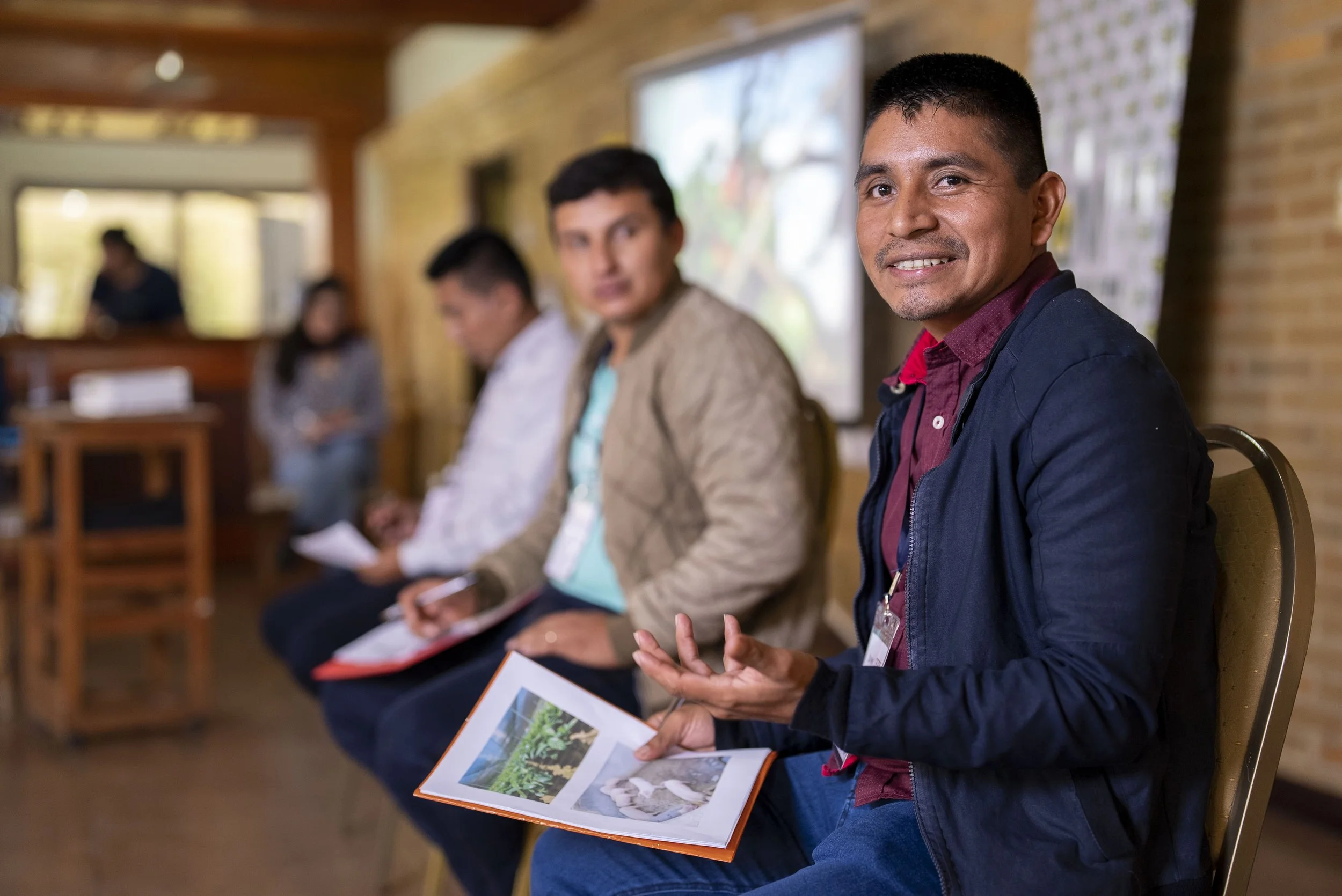
From the 2022 CDP Exchange at Manduvira Co-op in Paraguay
Church Bulletin #5
Non-Plantation Tea from Equal Exchange
The black or green tea that you drink every day probably comes from a plantation–even if it’s labeled fairly traded.* Today, the traditional plantation system instituted by the British in the mid-1800s is still going strong. It’s a system of cheap labor for work that is back-breaking and tedious; though harvesting is increasingly being mechanized, many tea leaves are still picked by hand. Workers on tea gardens, the majority of whom are women, come from the most vulnerable populations and are still locked into contractual arrangements like indentured servants. Since they are paid so little, family members have lived at the same tea garden for generations. Equal Exchange is working with groups that are slowly changing this oppressive model.
Over the years, there have been some reforms. About 70 years ago, shortly after independence, the Indian government enacted the Plantation Labor Act (PLA), providing a host of protections to plantation workers. While the PLA has improved the lives of some tea workers, tea workers remain deeply dependent on the plantations for all of their basic human needs. It’s almost impossible for the workers or their children to leave the tea garden to pursue a different future.
Equal Exchange, founded in 1986, has worked for several decades with alternative tea organizations to change existing power structures and build economic solidarity between farmers and consumers. Two groups that EE works with are Tea Promoters of India (TPI) and Biofoods in Sri Lanka. TPI and Biofoods assist the farmers with their processing and export logistics as well as organizational development. Through their democratic organizations, farmers can pool their resources and their harvests to trade at a meaningful scale.
A third partner, the Potong Tea Garden, located in India, is a farmer group that also uses TPI’s model. What’s unique about Potong is that it is a former colonial plantation that is now collectively run and partially owned by the workers, with shared ownership and processing support from TPI. This model represents a potential path to democratize India’s many plantations for farmers to have more say.
If we want to change the future for tea growers, we need to help build an awareness about problems in the tea industry and to work together to create a market for smaller tea farmers. This is why our congregation encourages folks to drink Equal Exchange. Through your purchases of EE tea for your own use and for gifts to family and friends, you are helping to weaken the grip of the plantation system and build a farmer-led future in tea.
Equal Exchange carries black, green, and herbal teas from India, Sri Lanka, South Africa, Egypt, and the U.S.
*Most black or green tea comes from India, China, Sri Lanka, or Kenya.

Farmers at Potong Tea Garden preparing the land for new planting in Darjeeling, India.
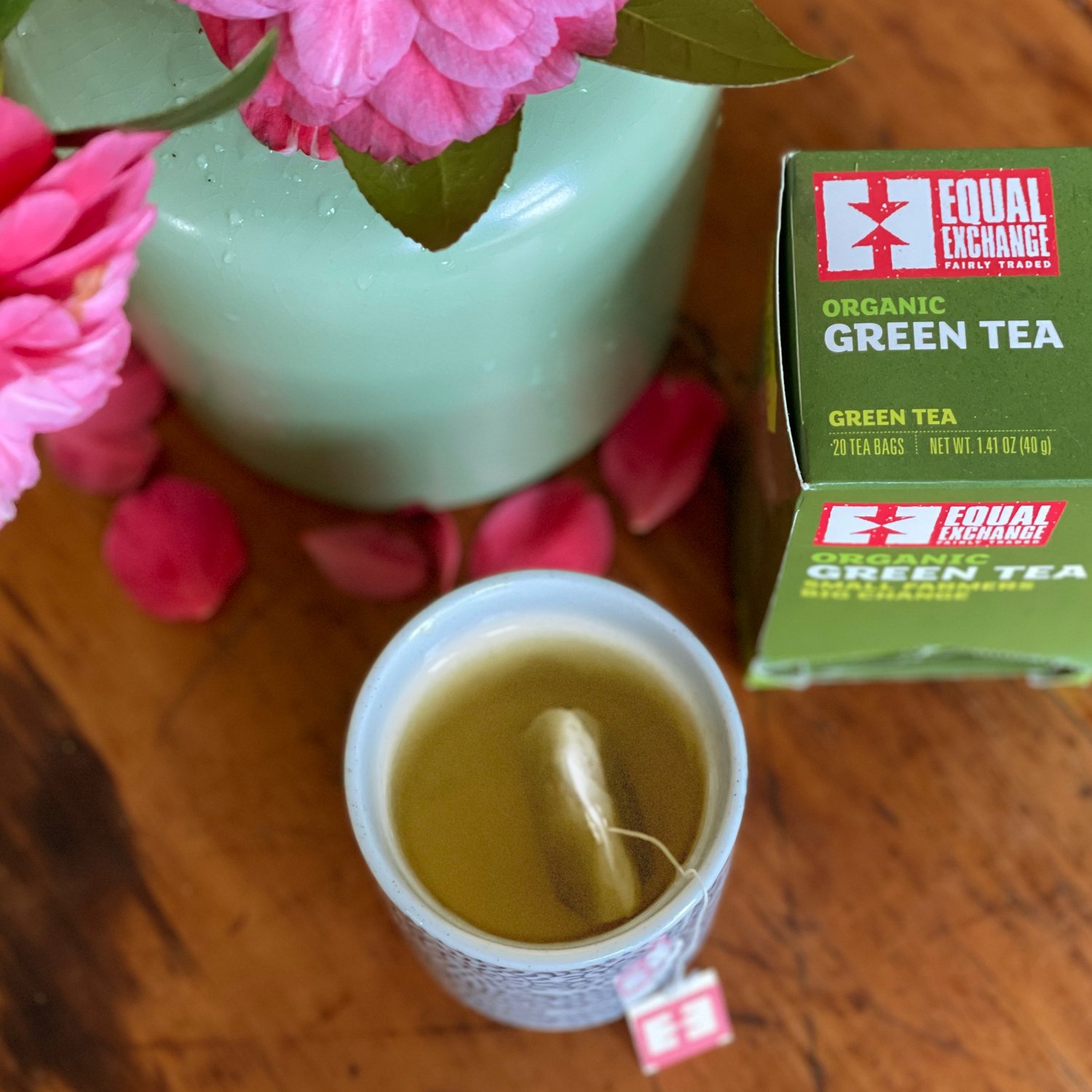
A cup of Equal Exchange Organic Green Tea
Church Bulletin #4
Olive Oil & Dates from the Palestinian Agricultural Relief Committee
When we purchase Equal Exchange Olive Oil or Medjool Dates, our congregation is supporting small farmers in the West Bank and the work of the Palestinian Agricultural Relief Committee (PARC), a nonprofit that promotes sustainable economic development among 41 West Bank cooperatives. With PARC’s assistance, farmers have been able to lower the cost of pressing their olives, storing and bottling the resulting oil, and exporting oil and dates to U.S. and European markets. Farmers also receive technical training through PARC and share best practices for pruning, plowing, irrigating, fertilizing, etc.
PARC not only supplies water and new seedlings to co-ops, but it has also built facilities for processing and storage. Additionally, it provides social services for women, children, and families. PARC also operates agricultural schools for students who are interested in pursuing farming as a vocation after completing their university degree. During the pandemic, PARC delivered thousands of food packages to farmers who were forced to shelter in place. Recently PARC has supplied aid to civilians displaced by the Gaza Israeli military operation against Hamas. PARC also assists workers who are under attack in the West Bank due to settler violence. Our purchases of PARC Olive Oil and Medjool Dates from Equal Exchange show our solidarity with Palestinians who are struggling to provide for their families.
The organic, cold-pressed, extra-virgin olive oil is made from Nabali olives, which are full of antioxidants. It has a rich flavor and can be drizzled cold on salads or used for sauteing or baking in many different recipes. The premium-quality Medjool dates are produced by a cooperative of 12 farmers in Jericho where date palm trees can thrive even in conditions where water is scarce or brackish. The Medjool dates themselves are large, soft, and have a sweet caramel taste. They are cleaned and sorted by a women’s cooperative that operates out of a new facility built by PARC in Jericho in the West Bank.
Given the extremes of climate change, agriculture is a risky and difficult business. But in the West Bank, arid conditions make it even harder. A severe drought, insect infestation, or a sparse crop yield can deeply affect a farmer’s ability to make a living. Equal Exchange acts in partnership with 40 farmer partners in 20 countries who are dealing with unpredictable and sometimes volatile weather conditions due to global warming. They establish long-term relationships with farmers and pay them above-market prices for their products. They also guarantee pre-harvest financing, organic premiums, and fair trade premiums. They prioritize people over profits and provide an alternative to the corporate model of trade. Our congregation is proud to support PARC olive oil, dates, and other Equal Exchange products.
Church Bulletin #3
Coffee that Reflects Our Values: Equal Exchange
When we serve Equal Exchange coffee during Fellowship Hour or sell it after services or for the holidays, we’re making a strong statement about our values as a community. We’re proclaiming that our congregation believes that it’s vital to keep small farmers on the land providing food for their families and having some economic control over their lives; that it’s important to work with indigenous producers and women; that sustainable agricultural methods are a vital way to address climate change.
In 1986 when Equal Exchange launched its organization, it helped to join a network of coffee farmers who were organized into cooperatives by Catholic priests trying to assist poor people to overcome poverty. It was a solidarity movement known as “Liberation Theology.” By working directly with democratically run small farmer cooperatives and offering fair prices and pre-harvest financing, Equal Exchange saw that it could be part of an international movement that was improving small producers’ access to worldwide markets so that they could survive and thrive.
Equal Exchange started its path with coffee from Nicaragua. Today, it partners with 24 farmer groups in 11 countries which produce high-quality organic coffees. EE purchases about 5.5 million pounds of green coffee beans each year from its partners to roast and sell to U.S. coffee drinkers. Equal Exchange buys exclusively from small-scale farmer cooperatives and associations. The farmers who produce Equal Exchange organic beans are committed to providing U.S. consumers with the highest quality coffee experience.
Our congregation is proud to serve a brew that is both delicious and reflects our values of social justice. By choosing this fairly traded coffee, you are supporting a whole separate ethical supply chain—not huge corporations. Enjoy it at church, buy some to bring home, share it with friends.
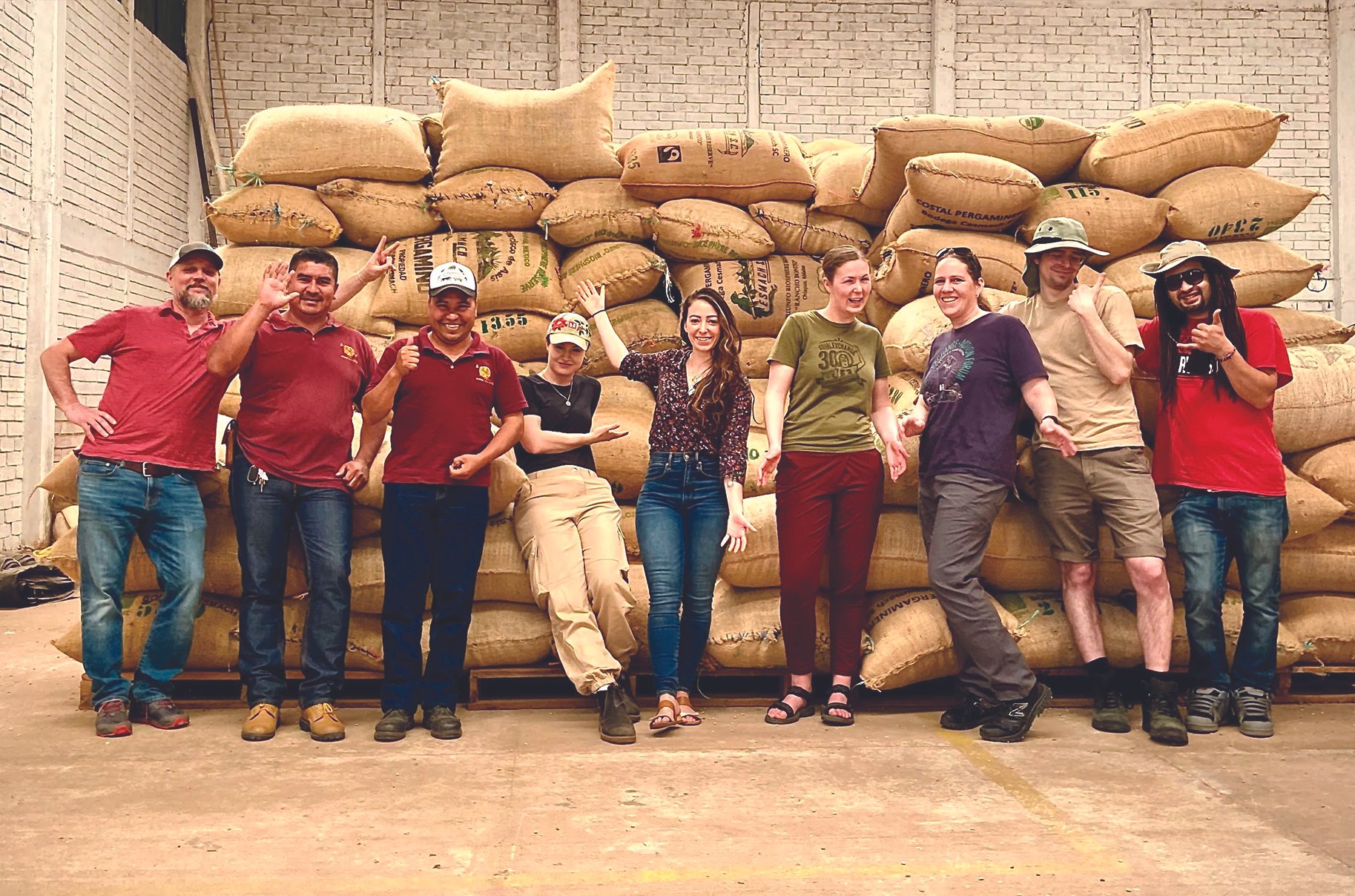
Equal Exchange staff visit with CESMACH co-op in Mexico.

Serving Equal Exchange freshly brewed coffee.
Church Bulletin #2
Impacting Climate Change with Equal Exchange Products
Our congregation supports Equal Exchange for many important reasons, including its focus on sustainable, organic agriculture. When we purchase Equal Exchange fairly traded food products, we’re assisting producers in co-ops who use regenerative, organic agricultural methods. Their crops are free of fossil fuel-based fertilizers, herbicides, or pesticides which pollute the environment and expose the farmers themselves to toxic chemicals. Rather than clearing fields and forcing crop exposure to full sun, co-op farmers plant assorted trees on their plots using a method called “shade-grown” farming. These biodiverse areas encourage native bird, amphibian, fish, and insect populations to thrive. As a result their coffee, tea, and cacao trees are stronger and more resistant to disease and pests. The co-ops use techniques such as natural composting and mulching to conserve water and keep it cleaner. These combined agricultural practices assist producers in helping the environment rather than harming it.
Healthy Soil is Key
Nature is full of amazing and complex systems. Take soil, for example. Healthy soil contains multitudes of microbes and has the ability to function like a sponge, which is the key to nature’s ability to return carbon to the land to cool the earth. When the farmers use sustainable techniques to enrich the soil by adding organic compost and minerals, moisture is retained and makes the soil “spongy” in texture. This “soil carbon sponge” absorbs more water in heavy rains and retains more water in times of drought. When farmers introduce fungi and other microorganisms, it stabilizes the soil carbon. Both erosion and evaporation are slowed by these sustainable practices which help to lower the earth’s temperature, a key component in fighting climate change.
The COMSA Cooperative and Farm School
Equal Exchange works with many groups who are leaders in developing a sustainable approach to agriculture that increases crop yields and adapts to changing environmental conditions. One such partner is COMSA, a coffee-growing cooperative based in Honduras, which has become a leader in sustainable agriculture by creating a model farm and a school. It has developed effective practices and soil enrichments through the use of natural microorganisms. COMSA offers educational classes to its own co-op members and to farmers throughout Latin America. It started in 2001 with 60 producers and has since grown to more than 1200 farmer members who are viewed as innovators in the area of sustainable agriculture.
Equal Exchange is a worker-owned U.S.-based cooperative of about 100 employees which sources organically grown coffee, cacao, tea, nuts, fruit, and other products from over 40 farmer cooperatives in 20 countries. An important component of its fair trade model is supporting sustainable agricultural methods which help to work against climate change.

Hiking through the COMSA coffee farms in Honduras.

Fredy Perez leads COMSA's technical assistance team.
Church Bulletin #1
Equal Exchange Offers Ethically Produced Chocolate
Equal Exchange, our fair trade partner, works with farmer cooperatives to bring the highest quality, organic products to congregations. By purchasing chocolate from a fair trade alternative supply chain, you're helping farmers to stay on their land, produce their crops, and plan for the future. Also importantly, you are purchasing chocolate that doesn't involve child labor in its production. Reports estimate that there are more than 2 million child laborers in the cacao sectors of the Ivory Coast and Ghana alone, countries which produce over 70% of the world’s cacao. The root cause of this problem is poverty. Farm families make roughly $2/day which is not enough to sustain them. The Equal Exchange alternative trade system is a different model that helps small farmers continue to produce cacao crops so that they can provide for their families.
Grown by small farmer co-ops
Equal Exchange works with CONACADO, a farmer cooperative which produces organic cacao for its chocolate bars. Over the past 23 years CONACADO has grown from 700 members, organized in three locations, to over 9,500 members organized in 9 locations with 142 local community associations throughout the Dominican Republic. Each of the 9 groups has a similar organizational structure: an Assembly of Delegates, with two delegates per association, that meets once a month to report on work plan progress at the community level; a Governing Board that meets once a month to execute the work plan; and an Administrative Committee that meets once a week to follow up on the work plan to make sure it is going as it should. A General Assembly meets once a year to approve work plans and decide how fair trade premiums will be used. Today, CONACADO members produce approximately 25% of the cacao exported from the Dominican Republic and the organization has become a powerful alternative for small-scale producers.
Supporting alternative trade
Equal Exchange works outside of the conventional system to build transparent and strong relationships with farmer cooperatives. They currently partner with four cacao co-ops in the Dominican Republic, Peru, Panama, and Togo. The sugar for the bars comes from co-ops in Paraguay and the vanilla from co-ops in Madagascar. Purchase and enjoy eating chocolate that reflects your values and provides farmers with a liveable income.

CONACADO technician showing Equal Exchange staff how to graft.

Juan Peñaló and Nieve Quezada, members of CONACADO co-op in the Dominican Republic.


